Native Nations Institute Welcomes 11 Prestigious New Members to the 2025 Tribal Professionals Cohort
The Indigenous professionals selected to participate in NNI’s year-long professional development program hail from nine different Native nations.

Since 2016, the Native Nations Institute (NNI) has provided a framework for Indigenous professionals looking to gain experience, build networks, and serve their communities through a year-long commitment to professional development that kicks off during the institute’s annual accelerated Indigenous governance education event known as January in Tucson (JIT).
Dubbed the NNI Tribal Professionals Cohort (TPC), the program was created to help address the realities and challenges facing Native communities today by providing a select group of service-minded Indigenous professionals with access to the knowledge and experience of NNI’s renowned Indigenous governance experts.
Cohort members receive a registration waiver to attend three accelerated Masters-level courses during JIT – an output of the Indigenous Governance Program held in partnership between NNI and the Indigenous People’s Law and Policy Program at the University of Arizona James E. Rogers College of Law. NNI TPC members also participate in quarterly seminars and other networking events with NNI faculty and staff throughout the year to help them find creative solutions to the most pressing issues in Indigenous governance.
This year’s NNI TPC welcomes 11 professionals representing nine Native nations with interests and expertise that include the environment, education, trauma-informed policy, government and Tribal services, nonprofit management and more.
Read on to learn more about the members of this year’s NNI TPC:
Jessica Bradby (Pamunkey Indian Tribe)
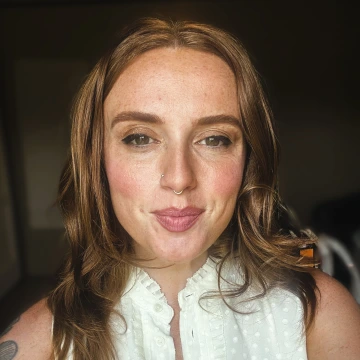
Jessica Bradby is a dedicated and experienced Tribal professional with a deep understanding of Indigenous cultures, traditions and governance structures. As a citizen of the Pamunkey Indian Tribe, she seeks to leverage her Tribal citizenship and expertise in Tribal affairs, community development and cultural preservation to make a meaningful impact on Indigenous communities while fostering collaboration and sustainable growth.
Serving as the Pamunkey Enrollment and Citizen Services Manager, as well as a board member for the Virginia Tech Indigenous Studies Program, Bradby demonstrates her passion for supporting Native students while ensuring Tribal histories are taught in secondary and post-secondary classrooms, and that Tribal data sovereignty is reflected in research practices.
As a board member of the Virginia Native Arts Alliance, Bradby seeks to uplift Native artists in Virginia by serving as a liaison connecting Native artists to opportunities in fine art institutions, local artisan markets and public outreach and education.
Estefanita L. Calabaza (Santo Domingo Pueblo/Kewa Pueblo)
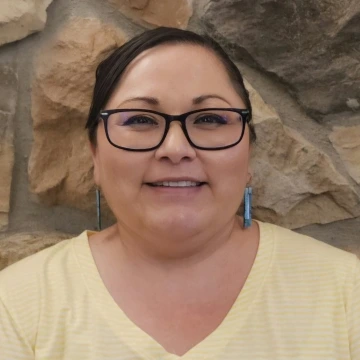
Estefanita L. Calabaza is the Santo Domingo Pueblo Prevention Program Manager and Tribal Behavioral Health Native Connections Project Director at the Kewa Family Wellness Center. In this position, she plays a pivotal role in Program Leadership, Indigenous-Centered Programming, developing and coordinating culturally-grounded programs, and implementing training sessions focused on suicide prevention, mental health and overall well-being.
Calabaza holds a Master of Arts degree in American Indian Studies from the University of Arizona. Her academic background fuels her passion for incorporating holistic healing traditions, Indigenous knowledge systems and culturally-grounded practices into program development. This approach fosters culturally-relevant support for the Pueblo community.
Karletta Chief (Diné/Navajo Nation)
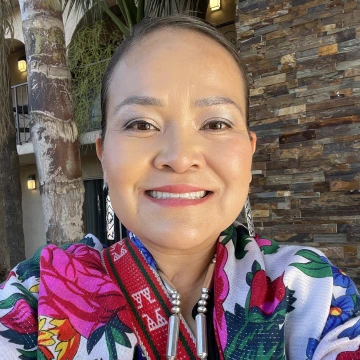
Dr. Karletta Chief is a University of Arizona Distinguished Outreach Faculty member and Professor and Extension Specialist in Environmental Science at the College of Agriculture, Life, and Environmental Sciences. Dr. Chief works to bring relevant water science to Native American communities in a culturally sensitive manner.
As Director of the Indigenous Resilience Center, she aims to facilitate the efforts of University of Arizona’s climate and environmental researchers, faculty, staff and students working with Native nations to build resilience to climate impacts and environmental challenges.
Dr. Chief also leads the NSF Indigenous Food, Energy, and Water Security and Sovereignty Program (Indige-FEWSS) and is training 38 graduate students. Indige-FEWSS’ vision is to develop a diverse workforce with intercultural awareness and expertise in sustainable food, energy and water systems, specifically through off-grid technologies, to address the lack of safe water, energy, and food security in Indigenous communities. Dr. Chief received a B.S. and M.S. in Civil and Environmental Engineering from Stanford University in 1998 and 2000, and a Ph.D. in Hydrology and Water Resources from the U of A in 2007.
Kristal Hill (Oneida Nation of Wisconsin)
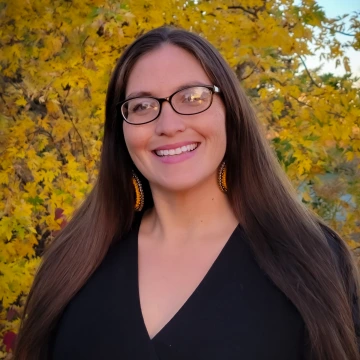
Kristal Hill is a dedicated Executive Assistant to a Councilmember of the Oneida Nation, bringing over 10 years of experience within the Oneida Nation to the position. Prior to her current role, Hill held various positions within the Oneida Nation including Environmental Land Contamination Surveyor, where she was responsible for ensuring environmental quality prior to land acquisitions.
Hill has collaborated closely with multiple departments, including the Casino, Programs and Governmental Management, where she has played a pivotal role in the development of policies and procedures designed to enhance the quality of life for employees.
Kristal holds an Associate’s degree in accounting and a Bachelor’s degree in business management. She is currently in the process of completing her Master’s degree in Sustainable Management and is poised to enroll in the Doctor of Education (Ed.D.) program in Applied Leadership.
Kristal is deeply committed to ensuring that the Oneida culture, community, and environment remains central to all decision-making processes. She actively engages with the community to uphold cultural values while simultaneously promoting economic growth.
Kristine Hill (Oneida Nation of Wisconsin)
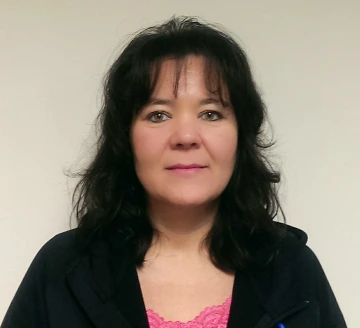
Kristine Hill is seasoned professional with over three decades of dedicated service in Tribal government and organizational leadership. As the current Government Operations Manager for the Oneida Nation, she brings strategic vision and deep cultural understanding to her role in directing personnel operations and driving organizational efficiency.
Hill’s professional achievements include securing over $2.5M dollars in grant funding and establishing innovative cultural programs. She also maintains a profound connection to her heritage as a mother and grandmother of enrolled Oneida Nation members. This connection fuels her passion for Indigenous healing practices, including growing traditional medicines, providing reiki services and practicing as a certified hypnotherapist. Her diverse interests reflect a holistic approach to wellness that bridges traditional wisdom with contemporary healing modalities.
Kristine's ultimate vision centers on facilitating generational healing and building sustainable wealth within Native communities. She firmly believes that addressing Indigenous historical trauma is fundamental to elevating not just individuals, but entire communities and nations. Her work exemplifies the principle that when Indigenous traumas are healed, the entire community rises together, creating stronger, more resilient nations for future generations.
Lilly James (Nez Perce Tribe)
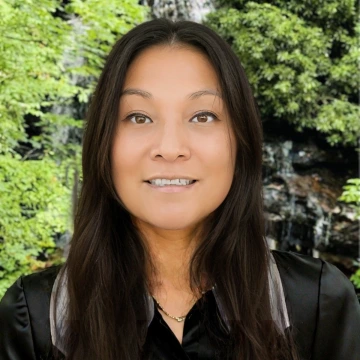
Lilly James is a dedicated professional with extensive experience in program and case
management, particularly within Tribal and Federal systems. As the Child Support Program Director for the Nez Perce Tribe, James oversees the Title IV-D Child Support Program, ensuring that family-centered, culturally relevant approaches align with Federal, state and Tribal guidelines.
Lilly’s career has included various roles supporting low-income and underserved populations, including positions in Temporary Assistance for Needy Families, the Head Start Program and health initiatives like the Special Diabetes Program for Indians. Her professional focus includes strengthening governing institutions and advocating for culturally-aligned programs that uphold the Tribe’s values and sovereignty.
Amanda Mitchell (Gila River Indian Community/Akimel O’odham)
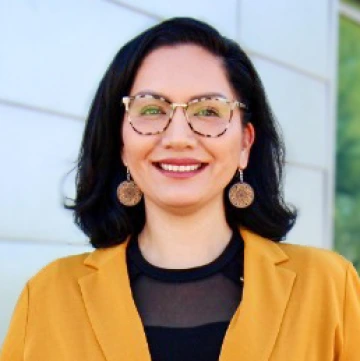
A proud member of the Gila River Indian Community (Akimel O’odham) and a descendant of the Omaha Nation, Amanda Mitchell is a committed grassroots community advocate, nation-builder and public policy strategist focused on advancing Indigenous governance and justice.
With dual Master’s degrees in Tribal Leadership and Governance and Public Administration from Arizona State University, Mitchell is driven to address systemic inequities, strengthen community well-being and advocate for Indigenous survivors and communities. Her work includes developing trauma-informed policies to enhance community protections, promoting governance practices rooted in cultural values and securing essential resources for Indigenous crime survivors through her active volunteer work with Crime Survivors for Safety and Justice.
Mitchell’s work in policy and grassroots advocacy is further amplified by her leadership with the National Association of Community and Restorative Justice and her active role in the Missing and Murdered Indigenous People movement. Motivated by a vision to strengthen Indigenous self-governance and create lasting change, Mitchell seeks to expand her knowledge and skills to better serve her community through her involvement with the TPC.
Adrianna Rivera (Pascua Yaqui Tribe)
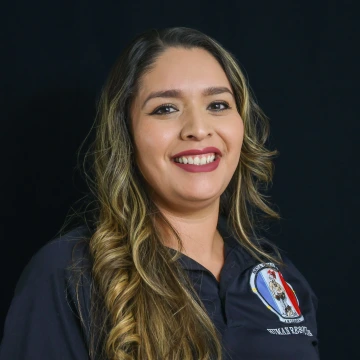
Adrianna Rivera is the Family Outreach and Engagement Coordinator for the Children's Social Services Department with the Pascua Yaqui Tribe. She has worked in the Pascua Yaqui Tribal community where she grew up for the past 10 years and, as a result, Rivera says she has “a deep and profound commitment to ensuring that the children in (her) community feel loved and supported so they may achieve all their hopes and dreams.”
Rivera’s commitment to the community has fueled her to earn a Bachelor’s degree in Sociology and a Master’s in Public Administration with an emphasis in nonprofit management. Ultimately, her engagement in these intellectual and professional pursuits is all undertaken with the understanding that they will help her better serve her community.
Lisa Summers (Oneida Nation of Wisconsin)
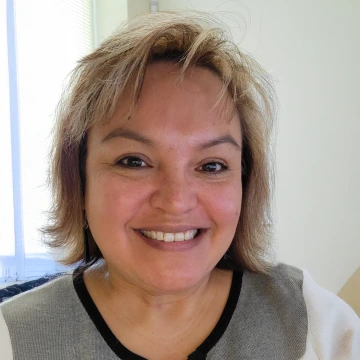
Lisa Summers serves the Oneida Nation as an Area Manager for the Nation’s elected governing body, the Oneida Business Committee. She has worked in various roles for the Oneida Nation government since 2005, including serving as the Nation’s elected Secretary from 2014-2020.
A lifelong resident of the Nation, Summers graduated with honors from local Freedom High School where she participated in the marching band and several sports. Her love for sports earned her the highest athletic honor of “Most Outstanding Senior Athlete” and, as a founding member for Oneida’s Community Lacrosse Program, it is a love that has stayed with her throughout the years.
Summers graduated with honors from the College of Menominee Nation with an Associates’ in Tribal Legal Studies before earning her Bachelor of Arts in Criminal Justice from Concordia University.
In addition to her professional pursuits, Summers utilizes her skillset to support Oneida families and the Nation’s Family Court by serving as Guardian ad Litem for the court. She also sits on the Oneida Professional Services Board, an 8(a) business within the Oneida Engineering, Science and Construction Group, of which she has been a member since its founding in 2022.
Sandy Thompson (White Mountain Apache Tribe)
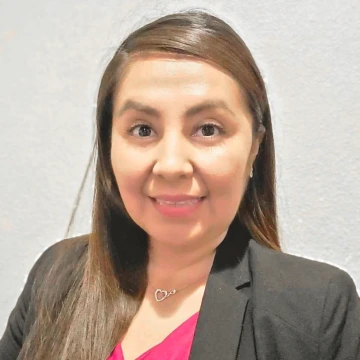
Sandy Thompson is an enrolled member of the White Mountain Apache Tribe and has lived most of her life on the Fort Apache Indian Reservation. In November 2023, she joined the Department of Interior Bureau of Indian Affairs at the Fort Apache Agency after serving the White Mountain Apache Tribe for 17 years. Thompson holds a Bachelor of Science in Business Administration with an emphasis in Accounting from the University of Arizona.
Thompson began her career as an Office Manager under the Tribe’s Emergency Medical Services department before eventually becoming a Staff Accountant in the Tribe’s Grants and Contracts department. In this role, Thomspon found a passion for working with other P.L. 93-638 funded programs and various funding agencies.
At the start of the COVID-19 pandemic, Thompson’s National Incident Management System training saw her assigned to the Tribe’s COVID-19 Response Team as the Finance and Administration Section Chief. Soon thereafter, Thompson returned full-time to the Grants and Contracts department, eventually serving as the Tribe’s Grants and Contracts Manager. In this capacity, she made it her mission to repair the relationships between grant/contract funded programs and the Tribe’s Finance department. She is very passionate about educating leadership and providing timely, accurate information that allows officials to make the best decisions.
Colleen Timmer (Native Village of Perryville)
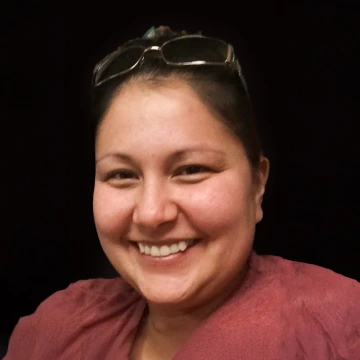
Colleen Timmer is a Tribal Administrator for two Tribes: the Native Village of Paimiut and the Native Village of Hooper Bay. “These two Tribes are my…extended family,” Timmer says, adding, “I have grown to care for them just as I do my own family. I want to see them be successful and thrive.”
Timmer recently received her Yup’ik name, Pektailnguq – which means “one who does not waver,” or “one who is steadfast or firm” – from the Paimiut Traditional Council. She is the granddaughter of Ralph and Oleana Phillips and Marvin and Nora Milbrett, and the daughter of Brian Milbrett and Effie Torgrimson. Timmer was born and raised in Anchorage, Alaska. Her mother’s family is from Perryville, Alaska and her father is from Oregon and Minnesota. She is of Alutiiq, German and Norwegian descent.
Timmer currently lives in Chugiak, Alaska with her husband and three daughters, where she loves to subsistence hunt and fish for moose, rabbits and silver salmon.
To Timmer, family is the most important thing. “If I am not around my family, I feel unhealthy,” she says. “I need my family to be whole. We gather together as much as possible, and when we are together, that is when I am most happy.”

